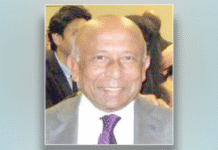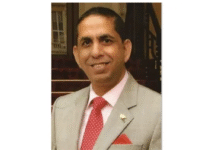
Three alliance agreement: 1990
In November 1990 three major political alliances of Bangladesh – one led by the Awami League, another by the BNP and the third byfive leftist parties -agreed on a framework to guide the democratic transition of the country from military rule. When a people’s movement toppled Ershad’s regime in December 1990, Bangladesh entered the club of what is popularly known as “Third Wave” democracies. Similar to the experiences of many of these new democracies, Bangladesh’s democratic journey has not been smooth. Instead of consolidating or deepening democracy, Bangladesh is facing persistent challenges of institutionalizing the basic foundations of democracy. Bangladesh is periodically wandering off the democratic path when the country is not even classified as a democracy by international organisations.
When international organisations or global surveys question our democratic status, many of us in return start questioning the quality of democracy of many of our critics. But, I think, instead of countering the arguments of our critics and raising questions about the democratic deficits of other countries, we should first try to assess whether we have been able to live up to the standards we ourselves set for us in 1990. We should begin by exploring how far our political leaders have implemented the pledges they made to the nation when they signed the three alliance agreement in 1990.
Through the three alliance agreement, the political leaders pledged their commitment to several key elements of a democratic system. First, they promised to organise free and fair elections through which people’s representatives will derive their mandate to govern the state. Second, they pledged to establish a sovereign parliament which will hold the executive accountable. Third, they promised to uphold the fundamental rights of citizens, independence and neutrality of the judiciary, freedom of the media, and the rule of law to ensure the sustenance of the democratic order. And finally, they promised to follow a democratic code of conduct to guide their actions, particularly in relation to each other.
Twenty five years later it is pertinent to ask: what is the record of performance of these leaders who signed the agreement? The leaders of the alliances, Sheikh Hasina and Khaleda Zia have taken their turns in ruling the country since 1991. How have they followed up on their commitments?
Free and fair elections
The three alliance agreement noted the many undemocratic electoral practices perpetuated by the military rulers and identified a system of non-party caretaker government (NCG) as a more appropriate mechanism to organise free and fair parliamentary elections. The 1991 parliamentary election, organised by a non-party caretaker government, which was widely recognised as the most free and fair election held so far in independent Bangladesh, brought the BNP to state power. Regrettably the BNP-led regime abdicated from its commitment to the original tripartite agreement and decided to hold the next election under its own incumbency. As a response, the AL-led opposition then started a mass movement to institutionalise non-party caretaker system as the poll-time government. The NCG was eventually institutionalised through a constitutional amendment in February 1996.
Three parliamentary elections, in June 1996, October 2001 and December 2008, were organised under a non-party caretaker government system which resulted in a relatively peaceful transfer of power through the ballot box where the incumbent political party/alliance invariably lost the election. But despite this regular rotation of power, the two major political forces of the country could not come to an agreement about a mutually acceptable arrangement to organise a credible parliamentary election. After each election, the losing party/alliance initially rejected the election results, but eventually accepted it and agreed to take their seats in parliament. However, the ruling parties tried to manipulate the non-party caretaker system to their advantage. Finally the AL-led government, using its overwhelming parliamentary majority, abolished the caretaker system in 2011. It is ironic that it was the AL who led a two year long mass movement during 1994 to 1996 to institutionalise the NCG system.
Since 2011 the two major political forces have failed to agree on the framework of a poll-time government. We witnessed a one-sided parliamentary election in 2014 where the majority of parliamentarians were ‘elected’ unopposed. We also witnessed unprecedented violence in the name of movements to “save democracy”. The political leadership of the two major alliances, who signed the agreement of the 1990 to initiate our democratic transition, have now assumed an inflexible, uncompromising attitude of “my way or highway” which now has created uncertainties about the organisation of future credible parliamentary elections and imperils our democratic future.
Sovereign parliament
As the three alliances could not agree on the restoration of a parliamentary system of government, the agreement promised a “sovereign” parliament to hold the government accountable. However, the parliamentary system was later restored through a rare bi-partisan agreement between the AL and the BNP. We now do have a ‘sovereign’ parliament but it does not function as an effective accountability institution which was the intention of the 1990 agreement. Since 1994, the opposition (no matter the party) started the practice of boycotting parliamentary sittings choosing instead street agitations to voice their criticisms or register their protests. As a result, the parliament came under the monopoly control of the ruling party/alliance without effective scrutiny of the parliament. The executive branch of the government became all powerful. Successive governments started passing laws and constitutional amendments without serious debate in the parliament.
And now we have an opposition in parliament which does not agitate on the streets or boycott parliamentary sittings, but they are not perceived as opposition, because some of their members are also members of the government and the opposition members in parliament have not yet demonstrated a capacity to seriously critique the government or propagate policy/position alternatives. So our political leaders who pledged a ‘sovereign’ parliament have established an institution in form but they made it ineffective and sometimes dysfunctional.
Rule of law, fundamental rights, independence of judiciary, freedom of media
The critical failing of our successive elected governments since 1991 has been in establishing the rule of law. Various global assessments have persistently given Bangladesh a low score in establishing the rule of law. The media has frequently reported on many cases of violation of law by ruling party leaders and workers (no matter which party is in power) and the pervasive culture of impunity. Though fundamental rights are enshrined in laws, in practice their violations cannot be redressed. Again over the years the media has frequently reported on violation of citizens’ rights by the state authorities as well as non state actors. The vulnerable groups, especially women and religious and ethnic minorities continue to be always at risk. The demand for ensuring the neutrality and independence of the judiciary is still continuing underscoring the lack of implementation of this particular pledge by successive governments. The promise of making the state-owned media autonomous has also not been implemented. However, thanks to the growth of privately owned media and the courageous and independent role of some of them, there has been a progress in citizen’s voice. All the state of democracy assessments indicates a steady progress in the voice indicator in Bangladesh which is a bright and positive spot among many negative trends.
Code of conduct
When we read today the detailed 8-point code of conduct the three alliances leaders pledged to the nation to facilitate organisation of a free and fair election, we are immediately struck by two thoughts: first, how relevant these codes of conduct still are for sustaining a democratic culture, and second, how far our leaders have deviated from these promises!
The 8-point code of conduct promised among others that political parties will respect and tolerate each others’ differences, permit peaceful party and campaign activities, not indulge in attempts to partisanise civil administration and law enforcement agencies, refrain from unethical campaign tactics such as questioning patriotism or religious faith of opposition members or use of communalism, adhere to electoral guidelines including campaign expenditure ceiling, and finally accept the results of the election.
We all know by now that the signatories of the three alliance agreement started violating almost all the points of this code of conduct even from the 1991 election. Over the years, the violations have become even more gross and repugnant.
Another agreement?
Since 2011, there has been much public discussion about the need for another agreement among the major political players to establish a common framework to guide our democratic journey. While the need is generally recognised, it is not clear how and when we will be able to reach such an agreement. There is a significant difference in the relative strength of the major stakeholders between 1990 and 2015. In 1990, there were groups who could exert influence on or mediate between the AL-led and the BNP-led political forces. In 1990, the students played an important role putting pressure on all parties to come to an agreement. The left party alliance played an important mediating role. But now students have lost their autonomous voice. All student organisations are firmly affiliated with one or the other political force and have no autonomous voice. The left parties have also lost their strength, and some have joined the AL-led political force. In the last few years, the BNP-led alliance also appears to have been significantly weakened. They are no longer in a position to put any real pressure on the AL-led forces to come to any accommodation. In such a situation an agreement can come about only if the AL leader Sheikh Hasina is convinced that accommodating some of the demands of the BNP will serve her enlightened self interest. At this stage she holds all the cards. The question whether she wants to earn immortality as the builder of democracy in Bangladesh?
Source: Prothom Alo









